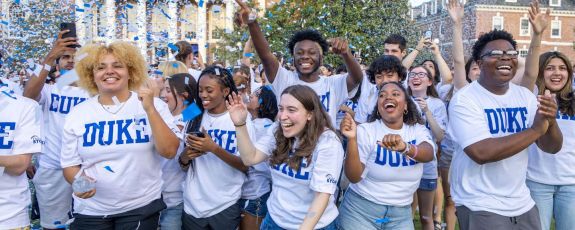
Duke Sees Record Number of Applications for Early Admission
Increase fueled by applicants from the Carolinas
Duke accepted 806 applicants via early decision, 145 of them from the Carolinas, an increase of 25 percent over last year. Of those, 121 students are from North Carolina and 24 are from South Carolina. They represent 18 percent of all students admitted through early decision this year. In all, 12.9 percent of the early decision applicants were accepted to the Class of 2028.
With the fall 2023 semester, Duke offered full tuition grants for undergraduates admitted to Duke from the Carolinas whose family incomes are $150,000 or less. For students from family incomes of $65,000 or less, Duke will provide full tuition grants, plus financial assistance for housing, meals and some course materials or other campus expenses, without the need for student loans.
“That increase is another representation of our commitment to expanding access to a Duke education and strengthening the economic diversity of our student body while maintaining the highest standards of academic excellence.”
Provost Alec Gallimore
Of the early decision applicants, 97 were admitted through the QuestBridge National College Match program, almost twice as many as last year. QuestBridge, a non-profit that helps academically exceptional students with low incomes apply to top universities, has partnered with Duke since 2017.
“That increase is another representation of our commitment to expanding access to a Duke education and strengthening the economic diversity of our student body while maintaining the highest standards of academic excellence,” Gallimore said.
Of the 806 new students, 625 plan to enroll in the Trinity College of Arts and Sciences and 181 in the Pratt School of Engineering, said Christoph Guttentag, dean of admissions. International students comprise 8 percent, and 54 percent are female. Besides the Carolinas, the other states most represented among the applicants admitted early are California, New York, Texas and Florida.
“When we looked at the number of first-generation students and the number of students who indicated that they would apply for financial aid, we were struck and pleased not only by the academic quality of the applicants but by the breadth of backgrounds that they represented,” Guttentag said. “There was an astonishing number of very talented students, and this really was as challenging an early decision process as I've experienced.”